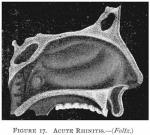Acute Rhinitis.
 Synonyms.—Acute Nasal Catarrh; Acute Coryza; Cold in the Head.
Synonyms.—Acute Nasal Catarrh; Acute Coryza; Cold in the Head.
Definition.—An acute catarrhal inflammation of the Schneiderian membrane, resulting in more or less obstruction of the nasal passages, and attended by a serous or sero-mucous secretion.
Etiology.—Among the predisposing causes may be mentioned age, the disease being more common in early life, especially in children, while the aged are comparatively immune. Hypertrophy of the mucous membrane, with narrowing of the passages, polypi, and adenoids, favors the disease.
The most common exciting cause is exposure to draughts of air and sudden atmospheric changes, so common during the early winter and spring months. The chilling of the body by wet feet during inclement weather is a very common cause. It may arise from the inhalation of irritant vapors, dust, or pollen.
At times it appears in epidemic form, which would suggest a specific germ. It also occurs as a symptom of several diseases, such as measles, scarlet fever, and the febriculas.
Pathology.—During the early stage, the mucous membrane is dry, red, and swollen, which causes obstruction of the nasal passages and renders the breathing difficult; this condition is soon followed by a profuse serous or sero-mucous secretion, which in turn may become purulent.
Symptoms.—One of the earliest symptoms is sneezing, which announces to the patient the fact that he is taking cold; this is attended by chilliness, headache, and often slight fever, the temperature reaching 100° or 101°. The pulse is full and rapid, the face slightly flushed, the skin dry and hot, the urine scanty and high-colored, and there is constipation.
The swelling of the mucous membrane obstructs nasal breathing, and the voice becomes nasal. When the inflammation is active the mucous membrane of the lachrymal ducts becomes swollen and the tears overflow—weeping cold. The sense of smell early becomes impaired.
Very early in the disease there is an irritating secretion from the mucosa, at first watery in character, soon changing to mucus or muco-pus. In severe cases there may be an extension of the inflammatory process to the Eustachian tube, attended by ringing in the ears and more or less pain, or it may extend to the pharynx, larynx, or even the bronchi.
Many times it is entirely of a local character, the only disagreeable symptom being a stuffy feeling in the head, attended by a profuse secretion, which necessitates the almost constant use of the handkerchief. Not infrequently the irritating secretion causes labial herpes—fever blisters. An attack usually lasts from three to six days.
Diagnosis.—Frequent sneezing, with catarrhal symptoms, renders the diagnosis very easy. We are to remember, however, that these same catarrhal symptoms are among the first evidences of measles and influenza.
Prognosis.—The prognosis is always favorable, though if neglected it is apt to assume the chronic form.
Treatment.—If seen at the very beginning, the disease can usually be aborted by a single dose of fifteen or twenty drops of specific gelsemium taken at bed-time, or a few drops of the following:
| Camphor and Turpentine | 2 ounces each. |
| Alcohol | ½ ounce. M. |
Sig. Of this eight or ten drops on sugar may be taken every three or four hours.
If it be a weeping cold, a half grain of powdered opium, taken at bed-time, rarely fails to cut short the disease. When this agent is used, the patient must be instructed to keep his bed the following half day to avoid the sickness that so often follows the use of opium.
Diaphoretic pwd. 3 grains, and quinine, 5 grains, taken at night, are also good to abort a cold. When these means fail to abort the disease, the treatment will vary according to the symptoms present.
Bryonia.—When the secretion is glairy, aconite and bryonia will give good results, while if the eyes burn or there is an acrid secretion from the nose and an overflow of the tear-ducts, rhus tox. will replace the bryonia.
Local Treatment.—Alkaline nasal washes may be used with benefit in the early stages; a weak solution of boracic acid, sodium bicarbonate, or common salt being among the best. Later, and when the secretion is thick, a few drops of camphor menthol and albolene solution, placed on cotton and introduced into the nostril, and allowed to remain for five or ten minutes, will give good results.
The Eclectic Practice of Medicine, 1907, was written by Rolla L. Thomas, M. S., M. D.

